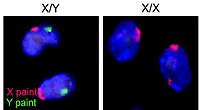
Photo from wikipedia
Abstract Sex offers advantages even in primarily asexual species. Some ciliates appear to utilize such reproductive strategy with many mating types. However, the factors determining the composition of mating types… Click to show full abstract
Abstract Sex offers advantages even in primarily asexual species. Some ciliates appear to utilize such reproductive strategy with many mating types. However, the factors determining the composition of mating types in the unicellular ciliate Tetrahymena thermophila are poorly understood, and this is further complicated by non-Mendelian determination of mating type in the offspring. We therefore developed a novel population genetics model to predict how various factors influence the dynamics of mating type composition, including natural selection. The model predicted either the coexistence of all seven mating types or fixation of a single mating type in a population, depending on parameter combinations, irrespective of natural selection. To understand what factor(s) may be more influential and to test the validity of theoretical prediction, five replicate populations were maintained in laboratory such that several factors could be controlled or measured. Whole-genome sequencing was used to identify newly arising mutations and determine mating type composition. Strikingly, all populations were found to be driven by strong selection on newly arising beneficial mutations to fixation of their carrying mating types, and the trajectories of speed to fixation agreed well with our theoretical predictions. This study illustrates the evolutionary strategies that T. thermophila can utilize to optimize population fitness.
Journal Title: Genome Biology and Evolution
Year Published: 2020
Link to full text (if available)
Share on Social Media: Sign Up to like & get
recommendations!